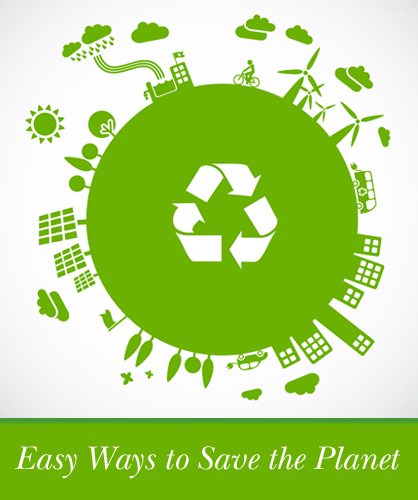50+ easy tips and tricks to help the planet
So you want to save the world and be sustainable. But you don’t know all the ways you can. In the midst of so many bewildering environmental problems, it can seem daunting. So here is an easy list of ways to make a difference environmentally speaking. Many of them are simple, some are surprising, and some you already know but are worth repeating. Whatever way you see it, we bet at least a few of the following actions will count as worth knowing. So please celebrate Earth Day and the place you live by practicing these easy responsibilities.
WAYS TO HELP
1. CHANGE YOUR LIGHTBULB
If every family in the U.S. swapped out just one regular lightbulb with a compact fluorescent bulb, pollution would be dramatically reduced – it would be the equivalent of taking one million cars off the road.
Tip: Create a compost pile instead of filling the landfill with your waste. Some of the things that you can add to it are your used coffee grounds and eggshells.
2. TURN OFF YOUR COMPUTER AT NIGHT
Are you one of the people who prefer to put your computer in sleep mode instead of properly shutting it down? You could save 40 watt-hours every night if you did, and if you have a slow computer, you can set it to turn on automatically a few minutes before you need it in the morning.
Tip: Buy a beehive and help repopulate a hugely important part of the economy: bees. Without bees, the earth would only last for 60 years!
3. DON’T PRE-RINSE DISHES
This one will save you time and money. Instead of rinsing dishes before cramming them into the dishwasher, just put them in unrinsed. This saves 20 gallons of water per load, not counting the energy to heat the extra water.
Tip: Drive a little slower. Traveling down the road at 50 mph would save 25 percent fuel versus driving at 70 mph.
4. DO NOT PRE-HEAT THE OVEN
Preheating the oven is often unnecessary. Unless you are baking bread or pastries, you only need to turn it on and place the dish straight in. Take it up another notch and check on your food by glancing through the window instead of opening the door.
Tip: Put on a sweater and put the heater on low.
5. THINK BEFORE YOU DIAPER OR HOW YOU DIAPER
We all know how fast those diapers add up. Well, they add up for the environment too. The average parent changes around 5,000 to 8,000 diapers per child. This translates to 3.5 million tons of waste in U.S. landfills each year. So consider cloth diapers or an eco-friendly disposable option.
Tip: Go for reusable Tupperware over plastic wrap or plastic baggies.
6. HANG DRY CLOTHES INSTEAD
This tip has multiple positive impacts. When you air-dry your clothes, you save the energy of a dryer, money, the color and fit of your clothing, and all will last much longer.
Tip: Before you buy your next appliance, ask about energy-efficient options.
7. GO VEGETARIAN FOR A FEW MEALS
Even just a few vegetarian efforts a week can help. Meat contributes to many environmental problems such as desforestation and water use. It takes 2,500 gallons of water to make one pound of beef, and each beef patty from animals raised on rainforest land destroys around 55 square feet of forest.
Tip: Go to the library instead of the bookstore, saving money and trees.
8. WASH COLD, NOT HOT
Flip a switch and save some energy. If all United States households used a warm-cold cycle instead of a hot-hot cycle when laundering, it would conserve the same amount of energy as 100,000 barrels of oil per day. You can also save by waiting to clean your clothes till you have an entire full load.
Tip: Get peddling on a bike, and skip the car every once and while.
9. WATCH THOSE PAPER NAPKINS
As unbelievable as it may seem, the average American uses about six napkins per day. So think before you grab that paper to wipe your fingers on. If we all could use one less napkin a day, we could reduce more than a billion pounds of napkins from being tossed in landfills.
Tip: Switch to low-phosphate laundry detergents; phosphates can kill fish and lower oxygen levels in water.
10. USE BOTH SIDES OF OFFICE PAPER
We go through about 175 pounds of paper per office worker each year. A quick fix is to set your printer to automatically print on both sides of the paper. And don’t forget to recycle!
Tip: Carpool with a colleague. Can’t find one? Try car sharing or vanpooling.
11. REUSABLE WATER BOTTLES
Plastic bottles take thousands of years to decompose. But we are running through innumerable plastic water bottles every day. So get yourself a reusable container and use the faucet to fill it up. Or at least toss your bottles in a recycle bin – almost 90 percent of plastic water bottles are not recycled.
Tip: Buy cloth bags specifically to carry home your groceries.
12. TAKE A SHOWER INSTEAD
Every week, try to have at least two showers instead of baths. Baths use around twice as much water as showers. Conserve water and the energy that would have gone to heating that water.
Tip: Avoid buying new products when you can maintain and fix older, yet durable products.
13. TURN OFF THE TAP WHEN BRUSHING
This one’s a classic, but true. Leaving the tap on while brushing your pearlies can pour up to 5 gallons per day down the drain. That could add up to more water than the residents of New York City go through – daily 1.5 billion gallons.
Tip: Maintain the temperature you want and save money by insulating your home.
14. SHORTER SHOWERS
You could probably shave off two minutes on a shower. And after finding out that that would save more than 10 gallons of water each time you do that, you may want to. If everyone jumped on board with this, we could save twice the amount of freshwater taken from the Great Lakes daily. Or you could cut down on shower water by taking a shower with your partner and possible discover some other benefits.
Tip: Consider which companies practice sustainability and which don’t. Shop accordingly.
15. PLANT A TREE
Another well-known but often overlooked choice, planting a tree can benefit the air and the land, can save energy on cooling by shading your house, and can even up your property value.
Tip: Learn how much enery solar panels can generate: Buy some.
16. TURN ON THE CRUISE CONTROL
Yes, that button has a function. Every time you use it, you get up to 15 percent better mileage. With the skyrocketing cost of gas, who wouldn’t want to put this one on their list?
Tip: Conserve 30 percent of your fridge’s energy by cleaning its dusty coils in the back.
17. GET THRFITY
Goods at second-hand stores can still be quality and definitely fall under that reuse mantra. Specifically, items for children are often abundant and in good condition, as many toys and clothes are quickly outgrown. And then you can sell them back when you are finished with them.
Tip: Slice the plastic rings from 6-packs so wildlife doesn’t choke or get trapped in them.
18. BUY LOCALLY PRODUCED
We often fly the food on our plate thousands of miles around the planet, wasting energy and generating pollution. So make a visit to your local farmers market and keep dollars in the local economy at the same time.
19. FIDDLE WITH YOUR THERMOSTAT
Adjusting your thermostat just one degree higher when it’s hot and one degree cooler when it’s cold can make a big impact. Each degree Celsius translates to a savings of 10 percent on your energy bill. A programmable thermostat can also save you cash as it regulates your home’s temperature based on whether you are at home or out.
Tip: Think twice before making that purchase. Buying less means less production.
20. DO YOUR ERRANDS ALL AT ONCE
Don’t let all those pesky errands take up too much of your time. Get a list and do them all at once to save time and gasoline.
21. GREENER LAWN CARE
If you need to water your lawn, it’s best done early in the day to avoid losing moisture to evaporation by sun and heat. Weeds can be spot treated with vinegar and skipping the raking allows your grass clippings to become fertilizer.
Tip: Keep your air filters in your air-conditioning clean and replace old ones once a month.
22. WHIP OUT A MARKER AT A PARTY
We have all probably been to a party or picnic where sometime during the night, endless plastic cups are crowding around and no one knows whose is whose. So get a permanent marker and scribble everyone’s names and presto, problem solved. Now you can stick to one cup and your own germs.
Tip: Put your refrigerator temperature between 36 to 38 and your freezer at 0 to 5.
23. RECYCLE OUTDATED CELLPHONES
With technology changing every second, the average cellphone only lasts around 18 months before it is replaced. That’s 130 million phones discarded each year. Should they be tossed into landfills, they would permeate toxic chemicals into our environment.
Tip: Be sure to clean your dryer’s lint filter between each load. It saves energy.
24. KEEP YOUR VEHICLE IN TOP SHAPE
Save money, save gas and stop pollution by keeping your air filters clean and your tires properly inflated. Also note what you lug around, as extra weight means more gas consumed.
Tip: Pull the plug on appliances you don’t use regularly.
25. RECYCLE OLD WIRE HANGERS
Wire hangers are composed of steel, a material usually not accepted by recycling programs. So try carting them to the dry cleaners to be reused or recycled.
26. WORK FROM HOME ONE DAY
Ask your boss if you can stay home and work from home at least one day per week. Sleep in a little and lounge around in your sweats while saving time and gas.
Tip: Look into buying green electricity, which is produced by low-pollution plants.
27. BUY SUSTAINABLE CLEANING PRODUCTS
There are a number of sustainable cleaning products that are free of harmful chemicals. Read the labels of what you buy and find alternatives. You may want to look into items such as baking soda or simply apply more elbow grease.
Tip: Try cedar chips or aromatic herbs as an eco-friendly alternative to mothballs.
28. SHUT YOUR FIREPLACE DAMPER
You may have not considered this, but an open damper is like an open window in winter. Warm air can escape through the chimney, costing you a few extra hundreds each year in heating costs.
Tip: Sprinkle recycled wood chips in your backyard to keep weeds in check and to retain moisture.
29. GET RID OF THAT JUNK MAIL
The average American rakes in 40 pounds of junk mail per year, in the process killing 100 million trees. So it’s worth your while to check out the services out there that can cut down those pesky mass mailings.
Tip: Consider renting or borrowing items you use infrequently, such as ladders or party decorations.
30. USE MATCHES, NOT LIGHTERS
Lighters are not only composed of plastic, but are powered by butane fuel, a petroleum product. More than 1.5 billion end up in landfills each year. Also, be sure your matches are cardboard and don’t come from trees.
Tip: Buy products with minimal packaging, including buying in bulk. Approximately 33 percent of what we discard is packaging.
31. LOOK IT UP ON THE INTERNET
Throw away the paper phone book … er, recycle the paper phone book. In one phone call to stop your phone book delivery, you can reduce waste and save paper. And face it, most people just use the Internet anyway.
32. DONATE EXTRA GOODS
Don’t throw anything reusable in the trash. This goes for a number of items. Someone else may find your trash to be a treasure. Charities would love your old goods or check out websites such as Freecycle.org, which connects people with free things.
Tip: Cut down on paper, both by buying recycled and then using that discarded paper for scrap paper.
33. VISIT A CAR WASH
You might be amazed at how much a professional car wash could reduce your water consumption. It is estimated that if all the families that usually wash their car on their own took it to the car wash instead, we could conserve almost 9 billion gallons of water.
Tip: Switch to printing with less-toxic, soy-based inks. Try to convince your entire company to make the change.
34. PLASTIC BAGS REALLY HURT
Go with that reusable bag – it is cheap and easy. And it doesn’t become part of the 500 billion plastic bags used across the globe each year; bags that aren’t biodegradable wind up in our oceans and in our food chain.
Tip: Promptly pay attention to water leaks.
35. GET YOUR SOFTWARE FROM DOWNLOADS
More than 30 billion compact discs are sold each year – far too much waste. So save on packaging and make it easier on yourself.
Tip: Conserve water with water-saving devices on your faucets and toilets. A low-flow showerhead is a must.
36. DON’T CHEMICALLY MELT THE ICE
When winter hits and snow piles high, quite a few whip out an ice melter. Although that benefits people, it’s harmful to pets that may intake the chemicals, and it contaminates drinking water. Look for an alternative in stores.
Tip: Never dump anything down a storm drain.
37. PAY YOUR BILLS THROUGH THE WEB
It is estimated that if everyone in the United States paid their bills online and stopped their paper statements, we could save 18.5 million trees every year, 2.2 billion tons of carbon dioxide and other greenhouse gases, and 1.7 billion pounds of solid waste. Some banks will even give you money or donate to your fav cause if you go paperless.
38. BUY RECHARGABLE BATTERIES
Most of the 15 billion batteries produced each year are disposable, and few are recycled. But rechargeable batteries are available. A charger and a set will pay themselves off quickly.
39. AND THE LAST, BUT MOST IMPORTANT: SHARE
Take this list and pass it on. Or pass any other environmental knowledge or tips you may have. If we could all change just one habit, the combined effect could be life changing for the better.
Sources: Sustainable Environment for Quality of Life; The Guardian; Wire & Twine
Tagged in: eco, tips, environment, 50, earth, help, planet, save, make a difference, tricks, ways, eco-friendly,

Purple Neon/LadyLUX via istock



